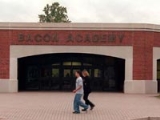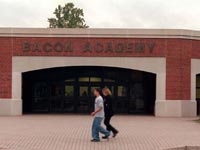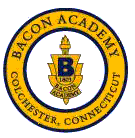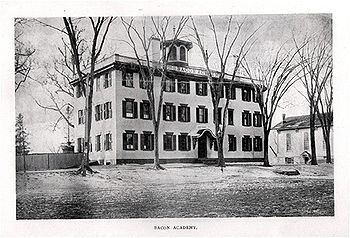
Bacon Academy
Encyclopedia

Colchester, Connecticut
Colchester is a town in New London County, Connecticut, United States. The population was 14,551 at the 2000 census. In 2005 it was ranked 57th on the "100 Best Places to Live" in all of the United States, conducted by CNN...
, in the United States
United States
The United States of America is a federal constitutional republic comprising fifty states and a federal district...
.
In 1800 a prominent Colchester farmer, Pierpont Bacon, died and left an endowment of thirty-five thousand dollars (with buying power equivalent to that of about two million dollars in 2009). The endowment was to the
- inhabitants of the First Society of Colchester for the purpose of supporting and maintaining a school…for the instruction of Youth in Reading and writing English, in Arithmetic, Mathimaticks, and the Languages, or such other branches of Learning.
This established the academy that bears his name. Bacon Academy’s doors opened to the children of Colchester on the first of November 1803 and from that point forward, prepared many young men and women for the life that lay ahead.
History

The trustees established an academic year of three terms
Academic term
An academic term is a division of an academic year, the time during which a school, college or university holds classes. These divisions may be called terms...
: the first term started in September and ended in December, the second ran from January to April, and the third, from May to August. Early class rolls show that the number of local students would fall in planting and harvesting seasons, many students skipping semesters or returning either late in the first term or leaving early in the second and not attending the Academy at all during the third.
Early Bacon students were neither given a diploma
Diploma
A diploma is a certificate or deed issued by an educational institution, such as a university, that testifies that the recipient has successfully completed a particular course of study or confers an academic degree. In countries such as the United Kingdom and Australia, the word diploma refers to...
nor graduated after four years, as they generally are today. Instead, the school had a system divided into three branches. In the first branch, a young student learned such subjects as languages, English grammar, and mathematics
Mathematics
Mathematics is the study of quantity, space, structure, and change. Mathematicians seek out patterns and formulate new conjectures. Mathematicians resolve the truth or falsity of conjectures by mathematical proofs, which are arguments sufficient to convince other mathematicians of their validity...
. In the second branch, he or she would be taught writing, geometry, and rhetoric. The last branch was similar to the common or grammar school. Age never factored into a student’s placement or progress; some students would leave Bacon at fifteen or sixteen if they had completed all three branches. In 1886, the branch structure was abandoned for the current four-year system; and by 1890, the first modern commencement was held, with each graduated student receiving a diploma.

Morning Prayer
Morning Prayer , is one of the two main Daily Offices in the churches of the Anglican Communion, prescribed in the various editions of the Book of Common Prayer and other Anglican liturgical texts...
. Afterward, the preceptor (the principal of the Academy) would talk about morals and the studies of his students. This routine was eliminated after 1846, and the bells were tolled only for the start of the school day.
Life as a Bacon student was strict. The attitude of the scholar had to be forthright and that of a gentleman or lady. In or out of classes, each was to behave properly and dress neatly—or risk punishment by means of “reproof, correction, admonition, or expulsion.” While in class, all pupils would sit diligently at their desks and study the Greek
Greek language
Greek is an independent branch of the Indo-European family of languages. Native to the southern Balkans, it has the longest documented history of any Indo-European language, spanning 34 centuries of written records. Its writing system has been the Greek alphabet for the majority of its history;...
or Latin
Latin
Latin is an Italic language originally spoken in Latium and Ancient Rome. It, along with most European languages, is a descendant of the ancient Proto-Indo-European language. Although it is considered a dead language, a number of scholars and members of the Christian clergy speak it fluently, and...
classics. At home, students usually studied when not working on their fathers’ farms or doing chores for their boarding masters.
After the centennial celebration, the national reputation of the school declined and the Academy drew its students chiefly from Colchester and surrounding towns. In time, Bacon became simply the public high school for the Town of Colchester. By 1962, the students had become too numerous for the then 160-year-old building on Main Street, and they were moved to a new schoolhouse adjacent to the grammar school. A major building spurt in the 1980s again impelled construction of a new high school, less than a mile east; the doors opened at the present site in 1993.
Bacon Academy celebrated its bicentennary in 2003, commencing the celebration with a special concert by the Bacon Academy Bands led by director Thomas Kessler. Other events included an all-class reunion, a golf tournament, and an open house at each of the buildings that ever had housed the Academy.
Sports
On March 21, 2009, the Varsity Girls Basketball team won the Class M State Championship with a 55-53 victory over Berlin.In 2010 and 2011, the Varsity Boys Wrestling team won back-to-back Class M State Championships. On February 26, 2011 the team captured the Connecticut State Open team championship, breaking Danbury's decade-long hold on that title; the team ended the season ranked first in the state of Connecticut.
As of March 1, 2011, the Varsity Girls Basketball team is ranked third in the state of Connecticut.
Famous alumni
- Stephen F. AustinStephen F. AustinStephen Fuller Austin was born in Virginia and raised in southeastern Missouri. He was known as the Father of Texas, led the second, but first legal and ultimately successful colonization of the region by bringing 300 families from the United States. The capital of Texas, Austin in Travis County,...
— The "father of TexasTexasTexas is the second largest U.S. state by both area and population, and the largest state by area in the contiguous United States.The name, based on the Caddo word "Tejas" meaning "friends" or "allies", was applied by the Spanish to the Caddo themselves and to the region of their settlement in...
" - William Alfred BuckinghamWilliam Alfred BuckinghamWilliam Alfred Buckingham was a Republican United States Senator from Connecticut.Born in Lebanon, Connecticut, Buckingham attended the common schools and Bacon Academy in Colchester, Connecticut. He engaged in mercantile pursuits and in manufacturing. He served as the mayor of Norwich,...
— Governor and Republican Senator for Connecticut from 1869–1875 - Lyman TrumbullLyman TrumbullLyman Trumbull was a United States Senator from Illinois during the American Civil War, and co-author of the Thirteenth Amendment to the United States Constitution.-Education and early career:...
- U.S. Senator of Illinois and co-author of the Thirteenth Amendment to the United States ConstitutionThirteenth Amendment to the United States ConstitutionThe Thirteenth Amendment to the United States Constitution officially abolished and continues to prohibit slavery and involuntary servitude, except as punishment for a crime. It was passed by the Senate on April 8, 1864, passed by the House on January 31, 1865, and adopted on December 6, 1865. On...
. - Morrison Remick Waite — Supreme Court Justice, January 1874- March 23, 1888
- Morgan Bulkeley - Mayor of Hartford, Governor of Connecticut, Republican Senator for Connecticut from 1905–1911, and a member of the Baseball Hall of Fame
- Ron WotusRon WotusRonald Allan Wotus is a former Major League Baseball shortstop and second baseman and current bench coach for the San Francisco Giants....
— Major League BaseballMajor League BaseballMajor League Baseball is the highest level of professional baseball in the United States and Canada, consisting of teams that play in the National League and the American League...
player and current bench coach for the San Francisco GiantsSan Francisco GiantsThe San Francisco Giants are a Major League Baseball team based in San Francisco, California, playing in the National League West Division.... - Chad BromleyApathy (rapper)Chad Bromley , better known as Apathy is an underground rapper and producer from Willimantic, Connecticut. He attended high school at various schools in Connecticut. He is a re-founding member and unofficial leader of the Demigodz crew...
— Hip hopHip hopHip hop is a form of musical expression and artistic culture that originated in African-American and Latino communities during the 1970s in New York City, specifically the Bronx. DJ Afrika Bambaataa outlined the four pillars of hip hop culture: MCing, DJing, breaking and graffiti writing...
artist under the name "Apathy".

